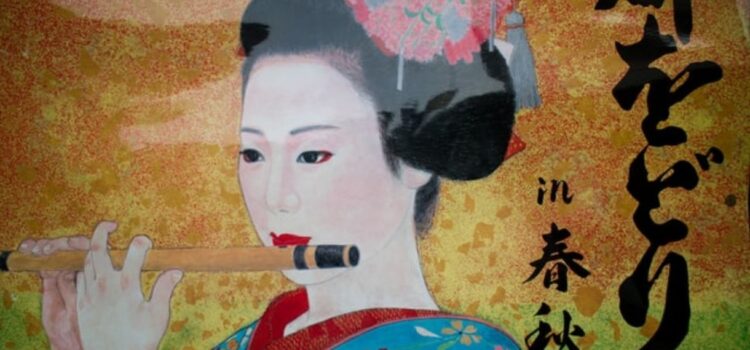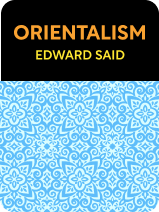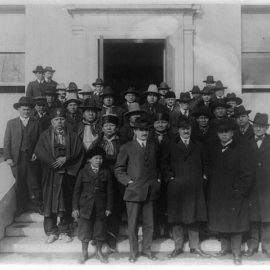

This article is an excerpt from the Shortform book guide to "Orientalism" by Edward Said. Shortform has the world's best summaries and analyses of books you should be reading.
Like this article? Sign up for a free trial here .
Who were the leading Orientalist scholars? How did their works influence the common perceptions of East Asian cultures?
As a scholarly discipline, Orientalism emerged in the late 18th-century when the study of East Asian societies became the major focus of academic attention in Europe. Orientalist scholars specialized in the study of languages, cultures, and modes of thought of the Eastern World.
Read about the most influential Orientalist scholars and their role in shaping the common perceptions of East Asian societies.
Orientalist Scholars: The Gatekeepers of the Orient
In the wake of the Orientalist research, scholars traveled to the East to collect knowledge about the East Asian societies, their religions, languages, and laws, which became the common tropes of the East Asian representations in European literature.
Antoine Isaac Silvestre de Sacy
One key figure within Orientalism during the early 19th century was the French nobleman Antoine Isaac Silvestre de Sacy (1758-1838).
De Sacy was one of the intellectual patriarchs of Orientalism, widely regarded within European academic circles for his work in translating Arabic as well as his success as a leading Persian scholar. His expertise as an Orientalist made him an important figure within the French imperial state. He served in key posts for the French Empire, advising on France’s interests in the Middle East. De Sacy was an important figure in straddling the gap between academia and public policy—a symbiotic relationship that would become a hallmark of Orientalism as the 19th century wore on.
De Sacy’s students went on to become some of Europe’s leading Orientalist scholars, including figures like Jean-François Champollion (1790-1832), discoverer of Egypt’s famous Rosetta Stone. Through them, de Sacy’s approach to scholarship influenced the study of the Orient across Europe for the next generation and well into the 20th century.
A figure fully within the Orientalist tradition, de Sacy saw his role as an interpreter, compiler, editor, and commentator on the Orient. He, like most Orientalist scholars, saw himself bringing to light and unearthing lost knowledge. He believed that experts like himself existed to transmit knowledge of the Orient to Europeans. This knowledge was a symbol and instrument of power. Knowledge gave European Orientalists the ability to define and proscribe the Orient in the collective mind of the West, and justify imperial incursions on the grounds that well-educated, enlightened Europeans were best positioned to save the culture and legacy of the Orient from the barbarism of the modern “Orientals.”
This was why his work focused on compiling vast stores of knowledge into multi-volume compendia for European consumption. Inherent to this compilation process was the scholar’s subjective judgments about which parts of the Orient were important and which weren’t, and what was and wasn’t worthy of inclusion. This Eurocentric approach to scholarship resulted in the erasure of those elements of Eastern culture and religion that the Orientalists deemed unworthy or unimportant.
Edward William Lane
One important European visitor to the Orient was the Englishman Edward William Lane (1801-1876). Lane wrote Manners and Customs of the Modern Egyptians in 1836, based on his years of extensive travel and observation in Egypt.
The book is an exhaustive account of contemporary Egyptian social, cultural, and family life. But Lane’s narrative is also filled with lurid details about supposed Arab cruelty and barbarism, sexual lasciviousness, harems, and polygamy.
Lane frames his observations and reflections of Egypt as a series of one-way interactions between himself and the locals. For him, Egypt exists as a source of knowledge, study, and fascination that his European readers experience vicariously. The Egyptians themselves are passive in his narrative; they do not comment on Lane or influence him in any way. They are not there to observe; instead, they exist to be observed and studied.
Vicomte de Chateaubriand
The French writer and diplomat François-René, Vicomte de Chateaubriand (1768-1848), detailed his journey to the East in Travels in Greece, Palestine, Egypt, and Barbary, During the Years 1806 and 1807.
Chateaubriand saw his travels as a pilgrimage. He was traveling to the Orient as a devout Catholic on his personal journey of self-completion and religious confirmation. He envisioned himself as following in the footsteps of the French Crusaders.
Just as the Crusaders of the Middle Ages had journeyed East to reclaim Jerusalem and the Holy Land from the barbarous Muslim infidels, Chateaubriand envisioned the Orient as his canvass, onto which he and his fellow Europeans could paint civilization and liberty—concepts that he believed the Arabs knew nothing about. He expressed this quite literally when he had his own name inscribed upon the pyramids.
For Chateaubriand, the mission of the European writer-traveler was to bring the Holy Land back to life from its dead, decrepit state.
Gustave Flaubert
A recurring theme in Western travel writing about the East is dangerous sex. In the minds of European writers and observers, the East is a world of sensuality, filled with lascivious women, harems, courtesans, and street prostitutes.
There, a European could escape the bonds of Christian sexual morality and indulge his carnal desires. Writers like the French realist novelist Gustave Flaubert (1821-1880) gave voice and expression to this Western image of the Orient.
In his account of his 1849 journey to Egypt (published as Flaubert in Egypt: A Sensibility on Tour), Flaubert described his experiences with an Egyptian courtesan and prostitute named Kuchuk Hanem. Flaubert’s recorded experiences with Kuchuk Hanem (and likely sexual liaisons with her) embody the Orientalist style and outlook.
He never delves into what her emotions and experiences might be. For Flaubert, she exists solely as an object of sex and desire, or else as a vehicle for his own creativity. With him, she is emotionally unattached, unreservedly sexual, undemanding, and submissive. In many ways, he sees these as the ideal female attributes, lamenting that the French prostitutes he knew in Paris lacked this unbridled femininity.
Flaubert projects these attributes onto Eastern women as a whole, essentializing them as sensual objects.
Richard Burton
Even the leading Orientalist scholars, men like Chateaubriand and Flaubert, could not stop themselves from automatically reducing the Orient to a series of essentialized archetypes.
Extraordinarily gifted writers with unique voices found themselves, wittingly or not, creating quasi-propaganda (or at least moral justification) for European imperialism in their writing about the Orient during the 19th century. This shows the power and reach of Orientalist modes of thought.
Some Orientalist scholars, however, did enter the Orient with extraordinary knowledge, and genuinely sought to describe Oriental life from the perspective of people actually living there. One such figure was the Englishman Richard Burton (1821-1890). Burton had genuine sympathy for the Arab perspective, spoke Arabic fluently, and was deeply disdainful of the ivory tower Orientalists in Europe who claimed to be experts about a place to which they had never traveled. Burton prided himself on the fact that his knowledge of the Orient was, atypically, not derived from the intensive study of ancient texts. Instead, his knowledge came from actual observations of the Orient and personal relationships with the people who lived there.
Yet even Burton’s writing is clearly suffused with the idea that his position as a European in the Orient by definition puts him in a position of supremacy and power vis-à-vis the people he encounters there. He was deeply conscious of his identity as an Englishman in Egypt and of the privileges that brought, thanks to the growing power of the British Empire in Egyptian affairs. For him, it was a matter of destiny that Great Britain would become master of the Orient, and that an ambitious Briton like himself could fulfill his destiny on the blank canvas of the Orient.
He could see the East in no other terms—it simply existed for the West. As he put it, “Egypt is a treasure to be won.”

———End of Preview———
Like what you just read? Read the rest of the world's best book summary and analysis of Edward Said's "Orientalism" at Shortform .
Here's what you'll find in our full Orientalism summary :
- How Western society invented the concept of Orientalism
- Why "the Orient" was thought of as a different, exotic, and dangerous place
- How Orientalism was central to European colonialism






